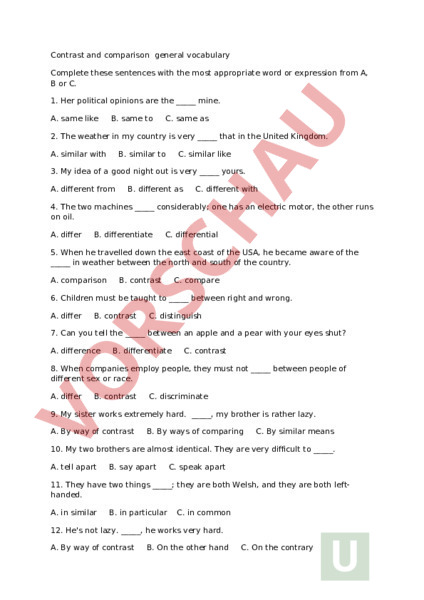Arbeitsblatt: Vocabulary
Material-Details
Vocabulary
Englisch
Wortschatz
10. Schuljahr
3 Seiten
Statistik
191106
308
1
16.10.2019
Autor/in
JYOTI ALAGUDAS
Land: Schweiz
Registriert vor 2006
Textauszüge aus dem Inhalt:
Contrast and comparison general vocabulary Complete these sentences with the most appropriate word or expression from A, or C. 1. Her political opinions are the mine. A. same like B. same to C. same as 2. The weather in my country is very that in the United Kingdom. A. similar with B. similar to C. similar like 3. My idea of good night out is very yours. A. different from B. different as C. different with 4. The two machines considerably; one has an electric motor, the other runs on oil. A. differ B. differentiate C. differential 5. When he travelled down the east coast of the USA, he became aware of the in weather between the north and south of the country. A. comparison B. contrast C. compare 6. Children must be taught to between right and wrong. A. differ B. contrast C. distinguish 7. Can you tell the between an apple and pear with your eyes shut? A. difference B. differentiate C. contrast 8. When companies employ people, they must not between people of different sex or race. A. differ B. contrast C. discriminate 9. My sister works extremely hard., my brother is rather lazy. A. By way of contrast B. By ways of comparing C. By similar means 10. My two brothers are almost identical. They are very difficult to. A. tell apart B. say apart C. speak apart 11. They have two things; they are both Welsh, and they are both lefthanded. A. in similar B. in particular C. in common 12. He not lazy., he works very hard. A. By way of contrast B. On the other hand C. On the contrary 13. He very rich and lives in big house., he doesnt seem very happy. A. On the other hand B. On the contrary C. On the opposite 14. British and Australian people share the same language, but in other respects they are as different as. A. cats and dogs B. chalk and cheese C. salt and pepper 15. We share the same language, but in other respects we are from each other. A. worlds apart B. miles away C. lifetime away Human actions Task 1. GENERAL ACTIONS Complete each of the sentences below with the most suitable word from the box. In some cases, more than one answer is possible. fainted • shivered • fidgeted • sweated • trembled • nodded dived started • squatted • crouched • dozed stretched • leaned leant • dragged • blushed 1. He woke up, stood up and his arms and legs. 2. The suitcase was too heavy to pick up, so she it across the platform. 3. We down to get through the low hole in the wall. 4. She on the floor, trying to get the stains out of the carpet. 5. He in and swam across the pool under water. 6. He out of the car window and was almost hit by another car coming in the opposite direction. 7. She in fear when she saw the lion come towards her. 8. She with cold in the bitter wind. 9. The tennis players in the hot sun. 10. She with embarrassment when he spoke to her. 11. She in surprise when she heard the loud bang. 12. She when she saw the blood, and remained unconscious for about ten minutes. 13. She off for while after lunch and was suddenly woken up by the telephone ringing. 14. When he asked her if she understood the question, she yes. 15. After an hour, he couldnt sit still any longer and in his seat. FCE SAMPLE 3 THE PERFORMING ARTS In the past, British children were frequently encouraged to try out their performing skills for the (0) . of adults. They did this by reading aloud, acting or (1) . musical instrument. As they (2) . up they were taken to public places of entertainment the theatre, opera, circus or ballet. They looked forward to these (3) . with great (4) . and would remember and discuss what they had seen for many weeks afterwards. But nowadays television and computers (5) . an endless stream of easily (6) . entertainment, and children quickly accept these marvellous (7) . as very ordinary part of their everyday lives. For many children, the sense of witnessing very (8) . live performance is gone forever. But all is not lost. The (9) . of TV set may have encouraged very lazy response from (10) . in their own homes, but the (11) . of those with ambitions to become performing artists themselves does not seem to have been at all diminished. And live performances in public are still relatively (12) . ,albeit with an older, more specialist audience. 60 Paper 3 Use of English 1 controlling handling doing playing 2 developed grew advanced brought 3 circumstances occasions incidents situations 4 sensation action thrill excitement 5 supply send stock store 6 applicable convenient available free 7 designs inventions exhibits appearances 8 special peculiar specific particular 9 attendance presence being company 10 spectators onlookers viewers listeners 11 want appeal pressure desire 12 famous favourite popular approved
